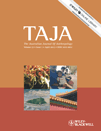
Australian Journal of Anthropology
metrics 2024
Bridging Knowledge and Cultural Understanding
Introduction
The Australian Journal of Anthropology, published by Wiley, stands as a pivotal resource in the field of anthropology, reflecting a deep commitment to advancing scholarly discourse since its inception in 1990. With an ISSN of 1035-8811 and E-ISSN 1757-6547, this journal provides a platform for innovative research and critical analysis, contributing to the global anthropology community. Based in the United States, at 111 River St, Hoboken, NJ, it has established itself in the Q3 category of anthropology journals, ranking #162 out of 502 in Scopus, placing it in the 67th percentile among its peers. While it is not currently an open-access publication, the journal remains dedicated to accessibility through institutional subscriptions and provides a wealth of insight into anthropological methods and cultural studies. It seeks to foster interdisciplinary dialogue and promote a comprehensive understanding of social dynamics, making it an essential read for researchers, professionals, and students eager to enrich their knowledge and engage with contemporary anthropological issues.
Metrics 2024
 0.20
0.20 0.50
0.50 0.70
0.70 31
31Metrics History
Rank 2024
Scopus
IF (Web Of Science)
JCI (Web Of Science)
Quartile History
Similar Journals

Revista Espanola de Antropologia Americana
Advancing Knowledge in Cultural StudiesRevista Española de Antropología Americana, published by UNIV COMPLUTENSE MADRID, SERVICIO PUBLICACIONES, stands as a significant contribution to the field of anthropology, particularly focusing on American societies and cultures. Since its inception in 1970, this journal has evolved, with issues currently being published until 2024, providing a platform for original research, reviews, and scholarly discourse. Despite being a Q3 category journal in the 2023 rankings, it plays a pivotal role in disseminating knowledge and stimulating academic debate within the anthropology community. With an ISSN of 0556-6533 and an E-ISSN of 1988-2718, Revista Española de Antropología Americana strives to engage researchers, professionals, and students with insightful content that reflects the dynamic nature of cultural studies. Although it operates under traditional access models, the rich array of topics covered ensures its relevance to ongoing scholarly conversation in social sciences and anthropology. Addressing a diverse array of anthropological themes, this journal is essential for anyone looking to deepen their understanding of the cultural frameworks shaping American societies.
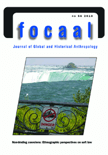
Focaal-Journal of Global and Historical Anthropology
Fostering Critical Analysis in Global AnthropologyFocaal-Journal of Global and Historical Anthropology is an esteemed academic journal published by BERGHAHN JOURNALS, focusing on the intricacies of global and historical anthropology. With an impressive impact factor and positioned in the Q1 category of anthropology for 2023, this journal is recognized for its exceptional contributions to the field, ranking #121 out of 502 in the Social Sciences category on Scopus. Since its transition to Open Access in 2020, Focaal has made significant strides in democratizing academic knowledge, allowing broader accessibility for researchers, professionals, and students worldwide. The journal provides a platform for interdisciplinary dialogue and critical analysis, paving the way for innovative research and thought-provoking discussions. With a commitment to fostering a deeper understanding of anthropological practices and their global implications, Focaal is an essential resource for anyone engaged in contemporary anthropological studies.
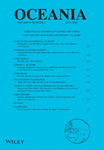
OCEANIA
Illuminating the Intersections of Culture and ThoughtOCEANIA, published by WILEY, is a distinguished journal that has been fostering scholarly discourse in the fields of anthropology and the history and philosophy of science since its inception in 1930. With an impressive impact factor and secure positions in the Q2 quartile for both categories, OCEANIA stands out as an influential resource for researchers and professionals alike. Its latest Scopus rankings reflect its commitment to quality, placing it in the 76th percentile for history and philosophy of science and the 66th percentile for anthropology. Though it does not operate under an open access model, the journal provides robust access options for institutions and individuals to explore its rich array of peer-reviewed articles that contribute to the understanding of cultures and scientific thought across the Pacific region and beyond. As we advance toward its continued convergence into 2024, OCEANIA remains a pivotal platform for innovative research and academic debate, cultivating insights that are crucial for scholars and students navigating the complexities of these interconnected disciplines.

CRITIQUE OF ANTHROPOLOGY
Challenging Norms, Shaping FuturesCRITIQUE OF ANTHROPOLOGY, published by SAGE PUBLICATIONS LTD, stands as a vital platform in the field of anthropology, contributing significantly to the discourse surrounding cultural practices and societal norms since its inception in 1974. Recognized for its scholarly rigor, this esteemed journal holds a Q2 category ranking in both Anthropology and Arts and Humanities as of 2023, with impressive standings in Scopus, including a rank of 55 out of 502 in Social Sciences and 107 out of 552 in Arts and Humanities. The journal's extensive scope—from theoretical critiques to empirical studies—facilitates a rich exchange of ideas among researchers, professionals, and students, thereby enriching the anthropology community. Although CRITIQUE OF ANTHROPOLOGY does not provide open access, its prestigious reputation and impact on the field make it an essential resource for those seeking to deepen their understanding of anthropological scholarship.

Virajes-Revista de Antropologia y Sociologia
Fostering Critical Dialogues on Contemporary IssuesVirajes-Revista de Antropologia y Sociologia, published by UNIV CALDAS, is a premier open-access journal that has been at the forefront of anthropological and sociological research since its inception in 2008. With the ISSN 0123-4471 and the E-ISSN 2462-9782, this journal offers a unique platform for scholars and practitioners to disseminate high-quality research that contributes to the understanding of social dynamics and cultural phenomena, particularly in the Latin American context. The journal seeks to foster an interdisciplinary approach, bridging theoretical and empirical research, and encouraging critical dialogues on contemporary issues in anthropology and sociology. By providing open access, Virajes ensures that its valuable content is available to a global audience, thus enhancing knowledge dissemination and engagement within the academic community. With its commitment to excellence and accessibility, Virajes stands as an essential resource for researchers, professionals, and students committed to exploring the complexities of human societies.
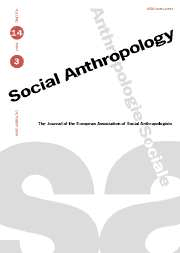
Social Anthropology
Navigating the Complexities of Social BehaviorSocial Anthropology is a leading journal published by BERGHAHN JOURNALS, focusing on the diverse and dynamic field of anthropology. With an ISSN of 0964-0282 and an E-ISSN of 1469-8676, this open-access journal has been a cornerstone of scholarly communication since its inception in 1982, becoming fully accessible to the public since 2022. Situated in the United States, the journal aims to disseminate high-quality research that explores sociocultural dimensions of human behavior across various contexts, addressing pressing contemporary issues through a multidisciplinary lens. With impressive rankings, including Q2 in Anthropology and Arts and Humanities, and strong positions in Sociology and Developmental Psychology according to Scopus metrics, Social Anthropology serves as an essential platform for researchers, professionals, and students committed to advancing our understanding of social practices and cultural norms. Its commitment to fostering intellectual discourse makes it a vital resource for those seeking to deepen their knowledge and insight into the anthropological landscape.
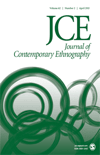
JOURNAL OF CONTEMPORARY ETHNOGRAPHY
Exploring the Depths of Modern EthnographyJOURNAL OF CONTEMPORARY ETHNOGRAPHY, an esteemed publication by SAGE PUBLICATIONS INC, is a leading journal that delves into the rich and dynamic field of ethnographic research. With a strong focus on anthropology, linguistics, sociology, and urban studies, this journal offers insights that are crucial for understanding contemporary social dynamics and cultural interactions. Established in 1972 and publishing continuously through significant eras of social change, the journal boasts an impressive Q1 ranking across multiple categories in the 2023 Scimago metrics, reflecting its prominence in the academic community. The journal holds a significant position, ranked #118 in Language and Linguistics and #67 in Anthropology within Scopus, showcasing its relevance and impact on both theory and practice. With no open access option, the journal dedicates itself to high-quality, peer-reviewed research that informs scholars and practitioners alike, underlining its importance as a reference point for advancing discussions in contemporary ethnography.

Anthropology Today
Charting New Territories in Anthropological StudiesAnthropology Today, published by WILEY, is a leading peer-reviewed journal in the field of anthropology, boasting a distinguished Q1 category ranking in the 2023 evaluations and a notable position within the top 79th percentile of its discipline according to Scopus. Established in the United States, this journal offers a rich compendium of contemporary anthropological research, covering diverse topics that shape the understanding of human cultures and societies. It is recognized for its rigorous academic standards and commitment to publishing innovative studies that reflect current trends and discussions within the field. While the journal is not open access, it provides insightful articles and reviews that are indispensable for researchers, professionals, and students seeking to enhance their knowledge and stay updated with the latest anthropological findings and theoretical advancements.

Gazeta de Antropologia
Advancing Understanding of Human Societies.Gazeta de Antropologia is an esteemed open-access journal dedicated to the field of anthropology, published by the ASOC GRANADINA ANTROPOLOGIA in Spain. Since its inception in 1982, this journal has provided a platform for scholarly research, fostering a global discourse on human cultures and social practices. With an ISSN of 2340-2792, it operates under an open-access model, ensuring that all research is freely accessible to readers worldwide. The journal has been acknowledged in the Scopus Rankings, positioned at #412 out of 502 within the Social Sciences category of anthropology, reflecting its commitment to disseminating high-quality research despite its current Q4 quartile ranking. As it converges its efforts from 2012 to 2024, Gazeta de Antropologia aims to engage researchers, professionals, and students alike, enriching the anthropological landscape through a diverse array of articles that contribute to the understanding of cultural dynamics and social structures.

Social Analysis
Bridging Anthropology, Culture, and SocietySocial Analysis, an esteemed academic journal published by BERGHAHN JOURNALS, is at the forefront of interdisciplinary research, focusing on the dynamic intersections of anthropology, cultural studies, sociology, and the arts and humanities. Since its inception in 2002 and having transitioned to an Open Access model in 2020, the journal ensures that critical social research is widely accessible to scholars and the public alike. With an impressive Q1 ranking in Anthropology and cultural studies and holding a notable Q2 in Sociology and Political Science, it garners attention from a large academic audience, as evidenced by its high Scopus rankings: 10th in general arts and humanities and 153rd in cultural studies. This signifies its influential role in shaping contemporary discourse and providing a platform for innovative ideas and methodologies in understanding social phenomena. Based in Brooklyn, NY, the journal is dedicated to fostering scholarly dialogue and advancing the field, making it an essential resource for researchers, professionals, and students eager to engage with and contribute to the field of social analysis.